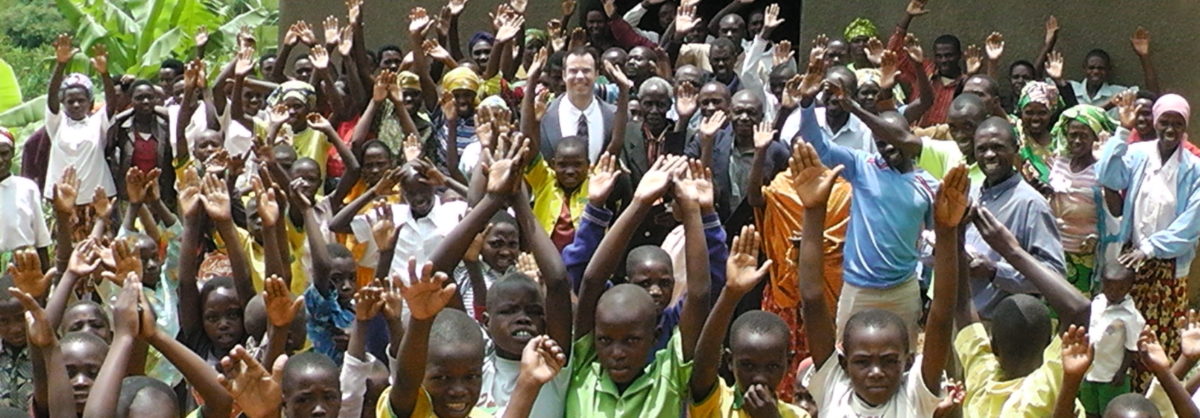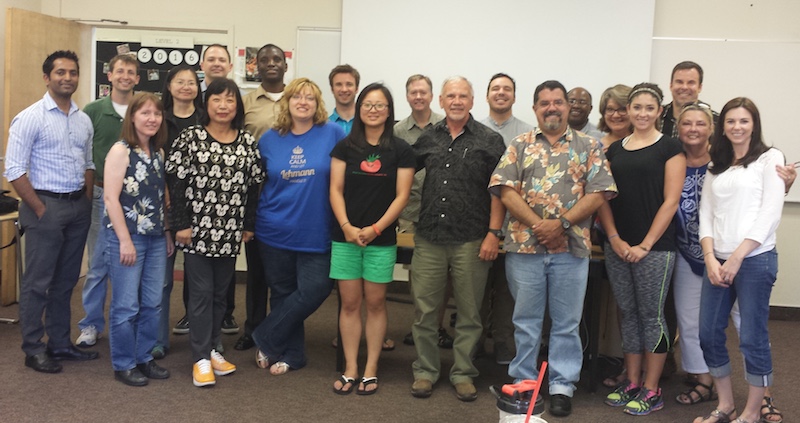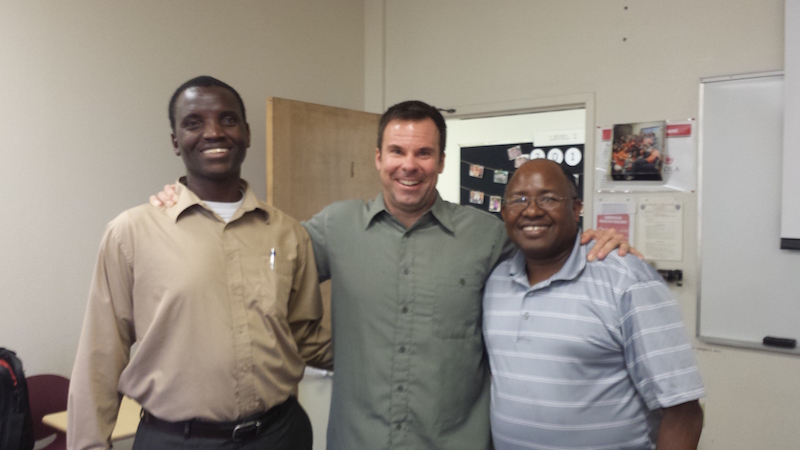A week ago I returned home after completing my first two courses in a long journey toward a Doctorate degree in Missiology. The first two courses were Honor and Shame taught by Dr. Steffen and Social Anthropology taught by Dr. Greene. A typical day while I was there looked like me leaving my campus housing at 7:30AM, in class solid till 5PM (with an hour lunch break), then heading to the library to study till closing, then back to the apartment and more studying till midnight or 2AM. Whew! Full days, but I learned much, and considering it was my first stretch re-entering academia in almost 20 years, the learning curve was steep.
At one point, the power went out in the campus housing, but I was not to be thwarted, and continued my studying by headlight, much to the amusement of my fellow students!
One of the best parts of the experience was meeting so many students, mostly working toward their PhD, who lived and worked in places all around the globe. We had students from China, Indonesia, Thailand, Mongolia, Korea, Kazakhstan, Romania, India, Zambia, Kenya, Latin America, and many other nations that made the heavily discussion-oriented classes a truly rich experience. While the professors did some teaching, at a doctoral level the students have much experience and insight that adds to robust interaction, and the profs facilitate the interaction. Times out of class were also sweet as I quickly got to know many students, especially those who are native Africans.
In my honor/shame class we dove into socio-cultural paradigms of innocence and guilt (which is the predominant pattern in the west – tied with justice and legal terminology), but we also explored far less commonly understood paradigms of honor/shame, power/fear, patron/client, individualism/collectivism, purity/pollution, etc. These paradigms are absolutely present in Scripture and in our world, but we in the West primarily focus on innocence and guilt due to the cultural patterns that began with Augustine and the Greeks, but primarily filled the West during the Reformation with Martin Luther. He focused much more on justice and law in Romans and other books, and the other paradigms fell by the wayside. Much more could be said, but it was eye-opening to see the plethora of passages (more than have to do with innocence/guilt) that focus on these other constructs, indicating that biblical writers and readers were from cultures that were less focused on justice and more on things like honor/shame and power/fear and patron/client. I need to consider these matters carefully as I write my final 30 page paper for this class and consider how the training I do globally must not be “western” but must instead be biblical.
The other course I took in social anthropology traced the major themes, thoughts and history in the field of anthropology. How people think, why they do the things they do, how cultures and societies are formed and patterns established, what unique practices happen in different parts of the world and why, there were a host of issues we tackled during our time together. A few key themes that we discussed that relate with my work are as follows:
1) Empowerment (with and to, not over) – Through the work my team and I do, we work to empower pastors globally to be better and more effective pastors.
a) Goal – In my case, I empower African pastors to learn to study the Bible (education), and then multiply trainings to other pastors. The education is about the dissemination of information (don’t like this term cause it sounds like “empowerment over”) through the correction of faulty practices (preaching with no preparation) and establishment of healthy pastoral practices, primarily focused on careful Bible study, and all this is done in the context of relationship. Perhaps hegemony (compliant absorption of ideas) is part of this process. Empowerment is essential for the reproduction and growth of the trainings, because the Africans I train will be 100X more effective at reaching their people than I ever could be. I would only slow things down, so I want to empower them, and then get out of the way.
b) The education style we use is constantly taken through the filter of empowerment. We try (and still have a ways to go) to use nonwestern (and non-traditional African) styles of education, minimizing linear lecture methods, and instead have them work in small groups (which Africans LOVE being in relationships and talking with others and working together), lots of interaction, practicing what we are teaching (they learn by doing rather than by us telling them), and much dialogue.
c) There is also an element in our work of empowering American pastors. Most have been preaching and investing in their congregations, but many have a desire to use their gifts globally, they just don’t know how. We go through a process of developing, empowering and releasing them where we train them to teach others in a cross-cultural context to study the Bible, bring them with us for one workshop, and then release them to work with this group over the next three years with some minimal coaching along the way. In this way we can reach far more countries and regions than we could if I was training alone.
2) In trainings we give, there are elements of utilitarianism and antiutilitarianism.
a) First, there is a utilitarian aspect to what we offer. I invest into the pastors, which improves them personally, individually, in a utilitarian sense. Their influence and marketability expands as others want to hear what they’ve been taught, their status and prestige rise as their ministry grows stronger and healthier (hopefully), their cultural capital increases (through knowledge and skills received) within the Christian community and in the eyes of the government (we offer them certification after completing the series of workshops which validates their role in society and legitimates their profession in the eyes of the government). Through the education, they gain knowledge and learn skills (in fact, their English skills and ability to think logically and critically improve), they improve and become more effective in their ministry, and hopefully their church will grow and get stronger and healthier.
b) But they are also antiutilitarian in investing in other pastors, and the main benefit being for the larger kingdom of God. Over the course of three years in the group, they also form strong relational connections, and lean on each other, encourage each other and support each other when I am away. This also ties in with some aspects of development, helping them build healthier, stronger, more effective social structures as they understand the Bible and can use it in growing their churches.
3) Embedded in the reproduction of the trainings is the need for social capital, for they will need to select certain pastors to train, and this will come from relationships they have with others, in their denomination or in their communities. Through the trainings we give the pastors, they gain social capital in increasing networks that grant greater influence and respect and reputation (people know they have been trained by a “mzungu.”) But they also need social capital to reproduce the trainings, because they are asking other pastors to take time out of their schedules and make contributions to receive the trainings. Some are taking the trainings far distances, to their home villages, and giving to clusters of pastors. Others are focusing locally. For example, Pastor Enock was trained to be a witchdoctor. God had other plans, and now he uses the many relationships he has and position of influence to get others to come to his trainings (13 trainings with 150 pastors who are training 500 other pastors).
4) There are also reciprocity elements, and I would say this is general reciprocity, for I give to the pastors in a general sense without them immediately giving directly back to me in a similar fashion to how I give to them. The primary benefit is in a general sense in the kingdom of God. They in turn give education to other pastors without them expecting to be given directly back as they have given.
I will also be writing a large 30 page paper for this class, linking all these subjects, doing much scholarly research and conducting interviews of those with whom I work in Africa, and then analyzing the data and synthesizing it down to some final conclusions.
In all, the investment was an excellent start to a long journey, and I am eager to continue on the road, trusting that God will help me to take what I am learning and effectively apply it to help African pastors to study and preach the Bible well.
Pressing on by God’s grace, Eric



